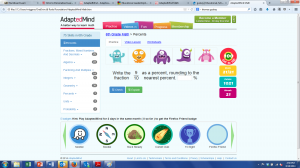Personalized Learning 101: Competency Based Learning, Part III
I’ve been blogging this summer as a participant in the Delaware Department of Education’s eLearning Delaware Personalized Learning 101 course. One of the topics covered in the course is competency-based learning (CBL). I’ve written about CBL here before, but wanted to share some additional resources that were part of the course, and also share one of my assignments, which helped me think about CBL in a more practical way.
One of our assignments was to read an article published in Educational Leadership by Dr. Thomas Guskey called, “Lessons of Mastery Learning.” The article outlines several different elements of implementing CBL (which Guskey and others call “mastery learning”) related to other interventions that are common practice for many educators. The main characteristics Guskey identifies as parallel to existing best practices are:
- Diagnostic pre-assessment with preteaching
- High-quality, group-based initial instruction
- Progress monitoring through regular formative assessments
- High-quality corrective instruction
- Second, parallel formative assessments
- Enrichment or extension activities
Guskey maintains that implementation of mastery (or competency-based) learning should focus on doing these core elements well, ultimately helping all students achieve excellence.
One of the activities we completed during this portion of the course was a demonstration of competency-based progression in the form of a game at Adapted Mind. We were linked to the 6th Grade Math exercises on the site and had the choice of completing any of several options. I chose the Fractions unit, and began working through the problems. I knew right away when I logged onto the site that this wasn’t like just any worksheet that I remembered from my elementary school days, though. Take a look at the screenshot below:
The Adapted Mind program had many advantages over the worksheets from my childhood:
- I got automatic feedback when I got a question correct or incorrect.
- When I got a question correct, the subsequent questions got more challenging—and vice versa.
- I kept track of my progress using the dashboard on the right of the page, and I could earn “badges” for certain performance milestones (10 correct answers in a row, 15 correct overall, etc.).
- I could leave the “Practice” portion of the site and get a video lesson or complete a more traditional worksheet to hone my skills.
Overall, using the Adapted Mind program is a practical way for teachers and parents to help students access many of the benefits of competency based learning by letting them move through the content at their own pace. (There are other programs and platforms that operate similarly—parents and teachers should do research to see what will work best for their students.)
One of our discussion questions helped me think about how I often have “Adapted Mind”-like experiences in “real life.” The question posed to the group was, “Discuss incidences of mastery-based learning that you have experienced in your life and in your educational setting.” While I haven’t had formal schooling that included explicit competency or mastery-based methods, I think there are many parallels between competency-based learning and how people work to acquire new skills every day. One example from my life is how I learned to ski. I drew the following parallels in my discussion response:
- Grouping:
- My learning experience: Even though I was a senior in college when I first learned to ski, I started on the bunny slopes with lots of younger “students.” I wasn’t just grouped with students my age—I was grouped with other people who needed to learn the same skills as me.
- Parallel to competency-based learning: I wasn’t just grouped with students my age—I was grouped with other people who needed to learn the same skills as me.
- Pacing:
- My learning experience: I practiced the rudimentary skills (getting on/off the lift, turning, stopping) until I felt comfortable on the bunny slopes, and then moved to more difficult terrain and more sophisticated techniques. As the learner, I chose my own pace and moved on when I was ready.
- Parallel to competency-based learning: As the learner, I chose my own pace and moved on when I was ready.
- Targeted Instruction:
- My learning experience: My younger brothers (who served as my instructors) coached me and gave me guidance tailored to the specific areas where I needed extra help—getting my left turns right. I learned from my peers, who helped me with specific target areas based on my strengths and weaknesses.
- Parallel to competency-based learning: I learned from my peers, who helped me with specific target areas based on my strengths and weaknesses.
- Applicable:
- My learning experience: Learning to ski was a challenge, and I was incentivized to learn because it was a way to spend time with my family. I was engaged in my learning and determined because I saw how the new skill connected to my life.
- Parallel to competency-based learning: I was engaged in my learning and determined because I saw how the new skill connected to my life.
Thinking about it through this lens helped me to link competency/mastery-based systems to how students already learn outside of the classroom, and most likely how they will be expected to learn when the join the workforce, or even as they learn new hobbies and skills.
The eLearning Delaware Personalized Learning 101 Course was full of great resources and the teachers and others who participated to the course were all engaged and enthusiastic about the possibilities of personalized learning in Delaware, and it’s exciting to think about how the group will move forward in their classrooms.
